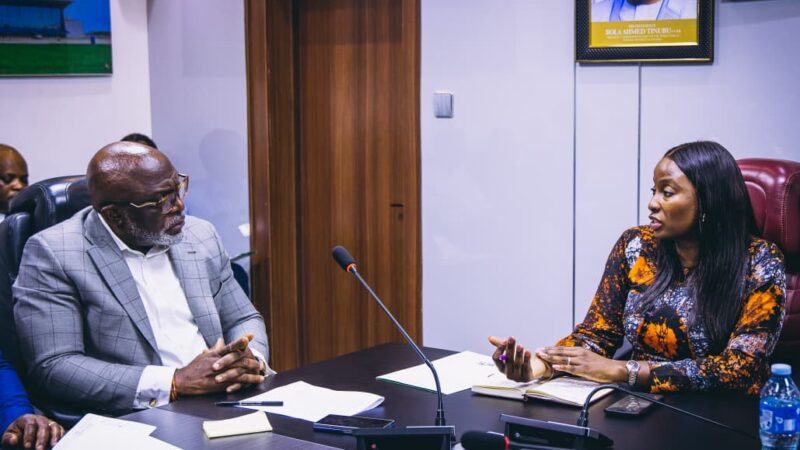FAAN’s contribution of 25% IGR to federation account will undergo constitutional review, says NASS

…calls for increase in bailout to airlines

L-R: Senator Smart Adeyemi, Chairman, Senate Committee on Aviation; Hon Nnolim Nnaji, Chairman, House Committee on Aviation;
Mr. Segun Koiki, Chairman, League of Airport and Aviation Correspondents LAAC; Captain Ibrahim Mshelia, Chairman, West Link Airlines and Chairman of the occasion; Engr. Akin Olateru, Commissioner/CEO, Accident Investigation Bureau representing Senator Hadi Sirika, Minister of Aviation at the 25th LAAC Annual Conference and Awards held at Sheraton Hotel, Ikeja, Lagos.
Nigeria’s Senate Committee on Aviation has said a presidential directive that mandates the Federal Airports Authority of Nigeria to remit 25 per cent of its IGR to federation account will undergo a constitutional review.
It would be recalled that a directive from the Office of the Accountant-General of the Federation, Federal Ministry of Finance, issued April 27, 2020 with reference: OAGF.TSA/93A/111 and titled: ‘Pilot Commencement of Automatic Deduction of 25% Operating Surplus’ was sent to FAAN and nine other government agencies, demanding them to pay 25 per cent inflows to the federation account.
Speaking at the 25th Annual Conference of the League of Airport and Aviation Correspondents (LAAC) held recently in Lagos, the Chairman, Senate Committee on Aviation, Smart Adeyemi said there was no constitutional basis for such a directive.
Adeyemi, who frowned at the controversial directive to the agency, said the matter would be reconsidered at the harrowed chambers with a view to exempting FAAN from the compulsory remittance of 25 per cent of its IGR to the federation account, based on constitutional grounds.
“We are looking at how we will navigate the pleas from agencies like FAAN to be allowed not to pay the required 25 percent IGR into the treasury because that would be in conflict with the constitution of the Federal Republic of Nigeria. We are looking at what can be done and that explains one of the issues why we have not passed the Bills.
“But when we resume from our recess, we would take a final position on that and look at how we can strike a balance between the 1999 constitution and what the Bill is seeking. But you know that in any situation where you have any law that is in conflict with the constitution, the constitution will take prominence,” Adeyemi said.
According to him, the Senate Committee for Constitutional Reforms, to which he is a member, would consider making the agencies more effective by either reducing the 25 per cent remittance benchmark imposed by the Federal Government or outright exemption.
“I am a member of the Senate Committee on Constitutional reforms and we would be meeting soon and some of these issues are what we would be looking at. We would be considering how we can make the agencies more effective by either reducing or outrightly asking them to use some of the funds that they generate,” he said.
Talking about challenges facing the airlines, particularly the bottlenecks they encounter in accessing foreign exchange for purchase of spare parts and other operational demands, the Chairman, House Committee on Aviation, Nnolim Nnaji, said the airlines deserve more support from the Federal Government apart from the relief in tariff to spare parts.
He said the government has not done enough in providing financial bailout to the airlines, considering the cost of their operations; and would like to see more subventions to the airlines, especially in making forex more accessible.
“The government didn’t do much in terms of bailout for the airlines. The cost of the engine of a Boeing is close to $10 million and what the government provided for all the airlines is about N4 billion, so, when tou compare what our airlines got to other countries, you will find out that they didn’t do much for the industry. The aviation industry is a very expensive business and most people do not break even. What they just succeed in doing is to just keep the business going because everything about the industry is offshore and that is a challenge.
“We have succeeded in getting zero duties for the airlines for the purchase of spare parts. Another issue that they are battling with is the issue of forex. Since they buy most of their stuff abroad, it is important that they have access to forex. The planes need to be in the sky all the time because the more you move, the more money you make so that you can pay your bills. We would want the Central Bank of Nigeria to create a window for Forex because it will help reduce the airfare.
“For now, I don’t know how the ban on Forex to BDCs will affect airlines but I heard that the black market rate has gone up. I still wonder if banks can manage but from next week, we will get to know how airlines are affected,” said Nnaji.







